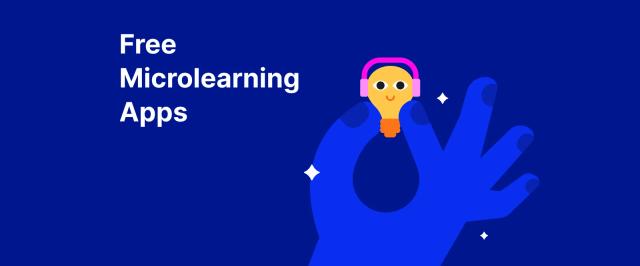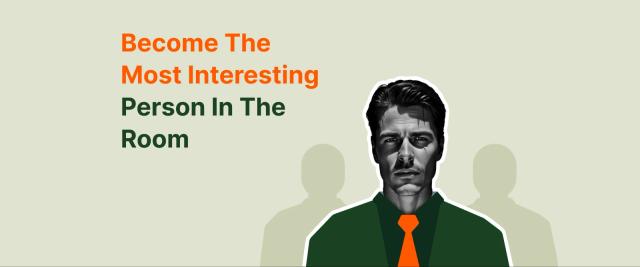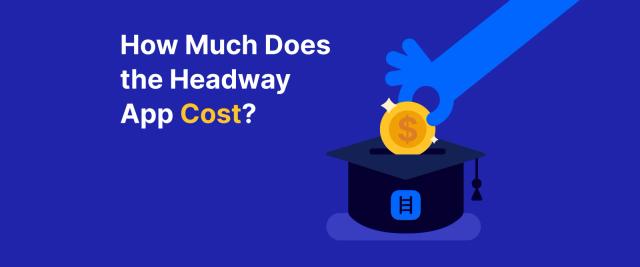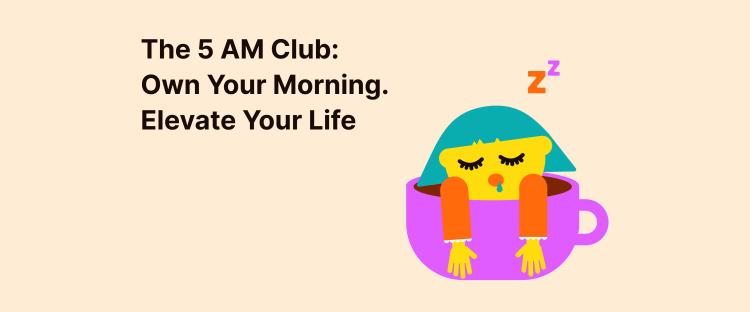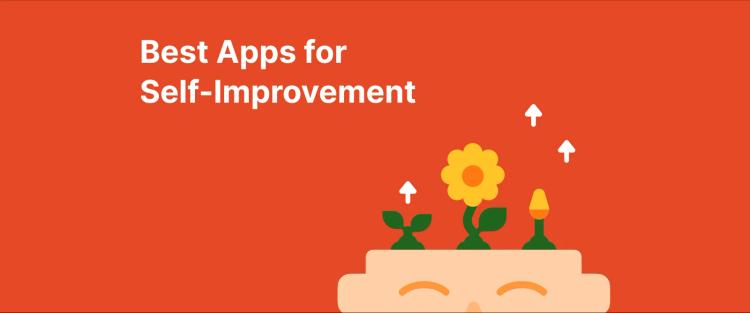It is estimated that people control 40% of their happiness. Making the most of this means understanding how to trigger the brain's "happiness neurotransmitters." It's no secret that some foods, like chocolate, contain "happiness hormones," and activities like exercise stimulate their production.
While TikTok is full of countless trends, the dopamine menu stands out. The concept aims to replace scrolling time with activities that enhance dopamine production through conscious choices of joyful activities.
What is this viral practice, and how can you create one that works for you? But before we dive into the dopamine menu, let's first explore how dopamine works.
For more insightful knowledge on happiness, download the Headway app!
Quick summary:
Dopamine is a neurotransmitter that powers your brain's reward system
A dopamine menu is a personalized list of mood-boosting activities categorized like restaurant menu items (appetizers, entrees, sides, desserts, specials)
Balance is crucial because sustainable happiness comes from purposeful activities like exercise, reading, or creative hobbies
Quick "appetizers" include making your bed, stretching, getting sunlight, or listening to music
The goal is replacing quick-fix pleasures with meaningful activities
📘 Boost your happiness naturally with a dopamine menu — learn how on Headway!
How to boost your happiness: Five proven steps
So, how can you normalize the levels of dopamine without becoming addicted? Aim for balance in all aspects of life, including nutrition, exercise, and hobbies.

For healthy happiness, you must:
Replace quick-fix pleasures with purposeful activities. For example, replace video games with learning how to play a musical instrument, doom scrolling with reading a fascinating book, and drinking alcohol with a fruit platter or delicious smoothie.
Prioritize quality sleep, as poor sleep wreaks havoc on dopamine sensitivity.
Take walks, especially in the evening, for fresh air and to help regulate melatonin so you can fall asleep more easily.
Build genuine social connections throughout your day.
Break big goals into smaller steps and carefully track your progress. This way, you can create a steady release of dopamine without overwhelming your system.
📘 Stop chasing cheap thrills and start building lasting joy with Headway!
Reduce the distractions and focus on slow dopamine release
When temptations attack you from all sides, and you can quickly get cheap dopamine with a few taps, it's hard to choose the more difficult path.
After all, why read a book when you could watch an entertaining YouTube channel? Why work hard to achieve long-term goals when instant gratification is a tap away?
Why build new social connections when social media likes come so easily?
"The dopamine desire circuit is powerful. It focuses attention, motivates, and thrills. It has a profound influence over the choices we make. Yet it isn't all-powerful. Addicts get clean. Dieters lose weight. Sometimes we switch off the TV, get off the couch, and go for a run. What kind of circuit in the brain is powerful enough to oppose dopamine? Dopamine is. Dopamine opposing dopamine. The circuit that opposes the desire circuit might be called the dopamine control circuit." ― Daniel Z Lieberman, 'The Molecule of More'
If you feel like you're losing control of your social media use or other quick dopamine sources, a dopamine detox may help. But be careful with this term.
This isn't a detox that eliminates dopamine for good, as your body will still produce it; you're just stepping back from potentially harmful triggers.
The goal is regaining control over your behavior, not depriving yourself. You can maintain optimal levels of this happy hormone through healthy daily habits integrated into your dopamine menu.
📘 Rewire your brain for happiness in just 15 minutes a day on Headway!
What is a dopamine menu?
The concept of a dopamine menu, also known online as the dopa menu, arose from a YouTube video by Jessica McCabe, author of the book 'How to ADHD: An Insider's Guide to Working with Your Brain (Not Against It).' This trend is not supported by research and does not have a solid scientific foundation.
Still, in its principle, it resembles behavioral activation in сognitive-behavioral therapy, which is a scientifically proven method of combating depression and addictions.

The idea is simple: know which activities trigger your feel-good neurotransmitters and incorporate them into your daily routine.
The idea is simple: know which activities trigger your feel-good neurotransmitters and incorporate them into your daily routine.
Track these activities in a journal, marking off your list of activities with satisfying physical actions like crossing them out or deleting them with a distinctive sound.
These small completion triggers actually help give you a quick boost of dopamine.
"There's no point in being unhappy about things you can't change, and no point being unhappy about things you can." ― Dan Harris, '10% Happier'
📘 Discover the science of feel-good hormones with Headway!
The benefits of a dopamine menu
Just as food fuels your body, a "dopamine menu" is a list of "meals" for the brain that inspire it, help it recover, and promote better concentration.
"Desire, when channeled effectively, becomes the fuel for success." – Daniel Z Lieberman and Michael E Long, 'The Molecule of More'
This mechanism is vital for survival, as it stimulates you to seek resources, avoid danger, and strive to improve your environment.
Without dopamine, motivation and the desire to take action are significantly reduced, which can lead to apathy and even depression.

Dopamine plays a crucial role in learning and memory processes. It helps the brain identify significant events and store information related to them.
This is especially important for adapting and making decisions based on past experiences.
For instance, when something works well, dopamine helps your brain remember that success, marking it a reference point for future decisions.
"By understanding what stimulates dopamine, we can intentionally incorporate activities into our daily lives that boost this neurotransmitter naturally." – Eduardo Pérez Mulet, 'Dopamina'
When you have a to-do list of things that bring both benefit and joy, it's easier to control and improve your life. Below is a template for such a menu.
📘 Create a life you love, one "dopamine dish" at a time, with Headway!
Creating your own dopamine menu
First, brainstorm activities that usually elevate your mood and write them down. Depending on the type of enjoyable activity, this list can then be classified as a menu.
Eric Tivers, founder of ADHD reWired, advises making your dopa menu just like a restaurant's menu, which is divided into sections for appetizers, main courses, side dishes, specials, and desserts.
Print the menu and make it visible: stick it on your fridge, make it a screen saver on your phone, or display it on your desk.
This constant visual reminder will reinforce your goals and keep you focused. To prevent spending time mindlessly on social media, set boundaries.
For example, set time limits on social media or even delete certain apps to avoid distractions.
📘 Regain control of your mood and motivation on Headway!
Appetizers
There are quick, easy steps you can take in the morning to lift your spirits without spending much time on them.
Making your bed
Stretching for a few minutes
Catching some sunlight
Listening to your favorite song
Drinking a cup of coffee
Playing with your pet

Entrees or main courses
Take on things you usually put off because they require more effort or time. This includes:
Hitting the gym
Practicing yoga
Engaging in self-care routines
Tidying up the closet or house
Taking a long walk through nature
Reading a new exciting book
Doing creative activities, such as drawing, painting, or writing
Participating in DIY projects like needlework
Spending quality time with family and friends
Playing a musical instrument
Sides
These are additional activities that can be done during the main course.
Listening to music, podcasts or audiobooks
Using a fidget toy
Using aromatherapy
Dessert
It is a special treat that pleases you. Desserts, as in the meal menu, are best consumed after the main meal and served as a delight and refreshment.
Watching your favorite TV show or movie
Shopping
Checking social media
Specials
These activities bring special pleasure and fill life with new experiences, although they are rarely done.
Having dinner outside the house (beach, lake, forest, park)
Going to a concert
Taking a spa day (massage, facial spa treatments, sauna)
Traveling
Understanding dopamine's role in your physical and mental health
For decades, many psychiatric, psychological, and medical specialists have studied dopamine's effects on the body. Now, let's examine how dopamine, or feel-good hormone, works.
It is a neurotransmitter that transmits signals between nerve cells in the brain and powers your "reward system." Essentially, it is a neural structure behind stimulating desire, pleasure, and reinforcement.

Here's an example: Think about chocolate. You crave it, imagine its taste, and can't wait for that first bite. When you finally eat it, pleasure kicks in. That's dopamine at work.
"From dopamine's point of view, having things is uninteresting. It's only getting things that matters. If you live under a bridge, dopamine makes you want a tent. If you live in a tent, dopamine makes you want a house. If you live in the most expensive mansion in the world, dopamine makes you want a castle on the moon. Dopamine has no standard for good, and seeks no finish line. The dopamine circuits in the brain can be stimulated only by the possibility of whatever is shiny and new, never mind how perfect things are at the moment." ― Daniel Z Lieberman, 'The Molecule of More'
A person's response to dopamine depends on its baseline level, the amount of dopamine constantly circulating in the brain and body.
Several factors affect this level, including how you feel, how motivated and energetic you are, and how good your mood is.
📘 Find your perfect balance of pleasure and purpose with Headway!
How dopamine affects motivation and body functions
The "happiness hormone" can affect your motivation. When you set goals for yourself, whether getting an education, completing a project at work, or even completing a small daily task, dopamine helps maintain motivation and motivates you to move forward.

When you do something enjoyable, your brain releases dopamine, encouraging you to repeat that behavior.
Different activities trigger different levels of release – eating sugar or playing video games might cause one or more significant spikes while completing a task or exercising creates a more moderate, sustainable increase.
When you think about something you enjoy, just anticipating that pleasure boosts dopamine production.
📘 Break free from the doomscrolling loop — start your detox on Headway!
"Understanding dopamine turns out to be the key to explaining and even predicting behavior across a spectacular range of human endeavors: creating art, literature, and music; seeking success; discovering new worlds and new laws of nature; thinking about God—and falling in love." ― Daniel Z. Lieberman, 'The Molecule of More'
There is no doubt that dopamine is responsible for pleasure, but that is not all.
James Giordano, MD, professor of the Department of Neurology and Biochemistry at Georgetown University Medical Center, told VeryWellMind in an interview that dopamine has a direct effect on many neurological, cognitive, and behavioral functions of the body, namely:
Movement
Thoughts and emotions
Excitement
Hormone and gland regulation
Memory and focus
Mood management
Pain perception
Sleep patterns
Stress response
📘Replace social media addiction with meaningful growth on Headway!
Dopamine = addiction?
Your brain releases dopamine during any pleasant activity – even for something as simple as scrolling through your social media feed. That's why many people become addicted to their smartphones and the Internet.
"Winners cheat for the same reason that drug addicts take drugs. The rush feels great, and withdrawal feels terrible. Both know that their behavior has the potential to destroy their lives, but the desire circuit doesn't care. It only wants more." ― Daniel Z Lieberman, 'The Molecule of More'
There is a list of things that quickly and temporarily increase dopamine levels:
Chocolate — raises baseline levels by about 1.5 times, though this spike lasts just minutes.
Sexual activity — doubles baseline dopamine levels for several minutes to an hour.
Nicotine — creates a brief 2.5-times increase.
Cocaine — spikes dopamine levels 2.5 times higher for 30-60 minutes.

When people become hooked on these intense dopamine rushes, they often lose interest in activities that offer subtle rewards, such as studies, relationships, or sports.
📘 Learn to control your impulses and master your mind with Headway!
When too much dopamine becomes a problem
The body isn't designed for constant dopamine highs; it's actually a form of imbalance. Both too little and too much dopamine can cause problems. This phenomenon applies to substance use but also to seemingly harmless activities like online shopping, watching videos on TikTok, or pornography.
"Contentment comes from letting go of the pursuit of endless desires." – Dan Harris, '10% Happier'
Too much dopamine can lead to:
Poor concentration
Delusions and hallucinations
Nervousness and chaotic thoughts
Difficulty with seeing situations clearly
Craft your happiness boosters with Headway book summaries
A dopamine menu is an exciting and unusual way to enhance your quality of life and enjoy your days to the fullest.
As you know, reaching goals and reading books help release dopamine. So why not delve into achieving happiness and brain health with the best books in the Headway library?

In addition, when you use the Headway app to listen to these fantastic self-help summaries, your dopamine level will rise. In just 15 minutes, you can grasp the key ideas from the complete book.
Take the quiz in the app, set your development goals, and start achieving them by establishing habits that really serve you by using the Headway app.
FAQs
How do you create a dopamine menu?
List activities that boost your mood, then categorize them like a restaurant menu: appetizers (quick mood lifts like stretching), entrees (time-intensive activities like exercising), sides (complementary actions like listening to music), desserts (treats like social media), and specials (rare pleasures like concerts). Display it visibly for daily reference.
What's the point of a dopamine menu?
A dopamine menu helps you replace mindless, quick-fix dopamine sources (like endless scrolling) with purposeful activities that provide sustainable happiness. It gives you a pre-planned list of healthy mood boosters, making it easier to choose meaningful activities when you're bored, stressed, or tempted by instant gratification.
What are four foods to avoid with ADHD?
While this article focuses on dopamine activities rather than ADHD-specific nutrition, common recommendations include limiting artificial colors, preservatives, excessive sugar, and processed foods. Consult healthcare professionals for personalized dietary guidance, as ADHD nutrition needs vary individually and require evidence-based approaches.
Does dopamine increase IQ?
Dopamine doesn't directly increase IQ, but it significantly enhances learning, memory, focus, and motivation — all crucial for cognitive performance. It helps your brain identify important information and form memories from experiences. Optimal dopamine levels support better concentration and decision-making, which can improve how effectively you use your intelligence.
What are 6 hobbies that boost dopamine?
Playing musical instruments, exercising or yoga, creative activities (drawing, painting, writing), reading engaging books, DIY projects like needlework, and spending quality time with friends and family. These activities provide sustainable dopamine release while developing skills and building meaningful connections, unlike quick digital fixes.
What is the dopamine diet plan?
The dopamine diet focuses on foods that support healthy dopamine production, typically including protein-rich foods (eggs, fish, poultry), tyrosine-containing foods (almonds, avocados, bananas), and limiting processed foods and sugar. However, this article emphasizes behavioral activities over nutrition for dopamine balance. Consult nutrition experts for specific dietary plans.


